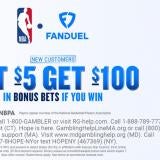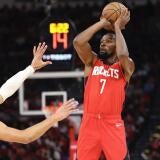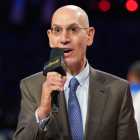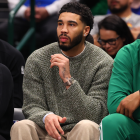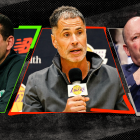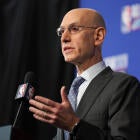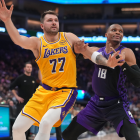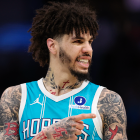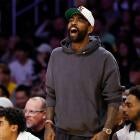
Nets' Sean Marks, Steve Nash talk Kyrie Irving, Ben Simmons: 'We're going to need availability from everybody'
Marks made it clear that Brooklyn is in need of a vibe shift
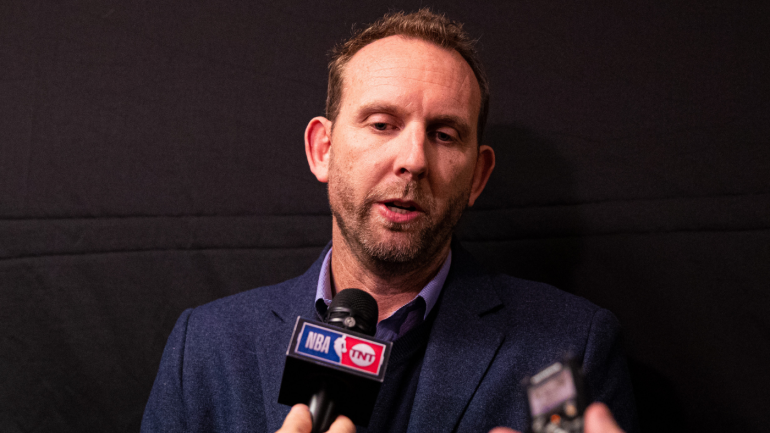
NEW YORK -- Brooklyn Nets general manager Sean Marks and coach Steve Nash met the media on Wednesday to discuss a season that went off the rails. The Nets were swept out of the first round, an almost unfathomable outcome when Marks' front office put the roster together.
Marks, who took the majority of the questions, held himself to account, saying that he has to "get back to the drawing board" and look for the type of players that can improve the culture of the team. He said that Ben Simmons has "a new lease on life, so to speak," after his recent back surgery. Most notably, Marks did not let Kyrie Irving off the hook for choosing not to get vaccinated and missing most of the season.
'We're going to need availability from everybody'
Sixteen days after Irving said that he looks forward to "managing this franchise" with Kevin Durant, Marks and owner Joe Tsai, a reporter asked Marks if the Nets were committed to Irving long-term. (Irving has a $36.5 million player option next season; if he opts out, he is eligible to sign a new contract for up to five years.)
"Yeah, look, I think that's something we've been discussing and we will continue to debrief on and discuss throughout this offseason," Marks said.
He added that the front office has decisions to make on "a variety of free agents," not just Irving. Brooklyn only has six players under contract for 2022-23, excluding player options.
"It would be unfair for me to comment on how it looks with us and Kyrie because, to be quite frank, he has some decisions to make on his own," Marks said. "So he has to look at what he's going to do with his player option and so forth like that. But I think we know what we're looking for. We're looking for guys that want to come in here and be part of something bigger than themselves, play selfless, play team basketball and be available. And that goes not only for Kyrie but for everybody here."
The key word there is "available." Irving did not get vaccinated against COVID-19 despite a New York City mandate and played in only 29 of Brooklyn's 82 regular-season games. The previous season, he took a sabbatical that turned into a seven-game absence because he violated the NBA's health and safety protocols while away from the team.
Asked if it will be necessary to tell Irving that his absences must only be injury-related, Marks said: "I think those are going to be discussions. It's a team sport and you need everybody out there on the court. And we saw this year, when you have Kevin miss 27 games with injuries and Kyrie being out for over half the season, I mean, that hurts. That hurts from a roster-building standpoint. That's not what we planned for."
Marks continued: "We need people here that want to be here, that are selfless, that want to be part of something bigger than themselves. There's an objective and there's a goal at stake here. In order to do that, we're going to need availability from everybody."
On how Irving's absence affected the team, Marks said: "I think it's obvious. Whenever you have a key part of your team that isn't available and you're trying to build chemistry, you're trying to build camaraderie out on the court, that's very difficult."
This was the rationale for shelving him before the beginning of the regular season, rather than allowing him to be a part-time player. Marks said that he does not, however, regret bringing Irving back into the fold before he was eligible to play at home, reiterating that, between Irving's absence and Joe Harris' injury, Brooklyn was asking Durant and other players "to take on too much." The team also had a COVID outbreak, further depleting its active roster. There was "no script," he said, for the situation the Nets were in.
"It made it difficult for all of us," Marks said. "Again, I don't want to make any excuses on that because I think there were a variety of teams out there, and the teams that are still playing to this day, they may not have had quite the extent of the excuses that we can come up with but they had to navigate COVID as well, they had to navigate injuries, they had to navigate all of this. And if I'm going to be brutally honest, they navigated it better than we did."
'He needs to be in here, smell the gym again'
A reporter asked Marks if he worries about the fact that both Irving and Simmons have missed a significant amount of games while physically healthy -- when negotiating a hypothetical contract, does he have to gauge how committed the player is to fulfilling it?
"100 percent," Marks said. "We have to factor all of that in. Honestly, where we are, when you're giving somebody a minimum contract and it doesn't pan out, it still factors into how you're building a roster and how much tax you're paying and so forth. So certainly when you're looking at players that are making 30 or 40 million dollars or potentially making that, you have to factor in everything. And that's the hard part of the business."
He continued: "What makes them tick? What drives them? Do they want to be part of this? Are they motivated by something that maybe is not good for the whole team here? So those are questions we're going to have to ask ourselves and also ask the players that we want to bring back in here."
While Irving could be a free agent in July, Simmons is already under contract for the next three seasons. Simmons will make $40.3 million in 2024-25.
Marks did not question Simmons' desire to play. "I think he was hoping more than anybody that he could come out and contribute to the team," Marks said. He was not able to come back against the Boston Celtics in the playoffs, though, and then he had another MRI on his back.
"We could see that the herniation had expanded," Marks said. "At that point, there was really nothing but surgery that was going to fix this. I can tell you that from the communications I've had with him multiple times since the surgery, he's feeling relief already, feeling great."
Marks said he did not want to talk about Simmons' or anyone else's "mental health or mental performance." The Nets, he said, are doing "everything we possibly can" to get him around the team.
"That is the key," Marks said. "He needs to be in here, smell the gym again, around his friends, around his family, around to be quite frank and participate in this and let us help him build a culture together, build up together, build him up, build him back up."
Simmons is "a big, big part of this," Marks said. "He fits a lot of holes, plugs a lot of holes that we think we potentially have. And with him in there, it's a different dynamic out there. It's a different dynamic for not only his teammates -- what they'll be asked to do in the roles they have to cover -- but also for the coaching staff, so they can put people in places where they were honestly brought here to [be] and not have to try and fill a different role."
'You'd love people who are versatile'
If there was one message that Marks and Nash wanted to communicate, it was that they know things need to change. Through all of Brooklyn's injuries, trades and shenanigans over the past two seasons, the team has always had championship aspirations. It fell far short of the goal, but the goal remains the same.
"I would be pretty naive if I thought we could just sort of run it back," Marks said. "Right? I think we can see not only where the NBA is going, but potentially how defenses are now set up to guard the likes of Kevin, Ky and those sort of max players. So we're going to have to put the right pieces around them."
Without Simmons and Harris against the Celtics, Brooklyn was too small and too big at the same time. The Nets' rotation included four small, slight guards (Irving, Patty Mills, Seth Curry and Goran Dragic) and the 6-foot-4 Bruce Brown, who played a Swiss Army Knife role usually reserved for players four or five inches taller. They also used five roster spots on big men (Nicolas Claxton, Andre Drummond, Blake Griffin, LaMarcus Aldridge and Day'Ron Sharpe) and Boston's wings repeatedly targeted the ones who made it on the floor.
"You'd love people who are versatile," Marks said. "You'd love people who can play multiple positions and so forth. I think we look at some of the teams that are playing now, I mean, they've got 6-10 point guards out there. They've got, you know, Golden State has a -- I don't want to knock Draymond [Green], but what is he, a 6-7 center?"
The Nets could tell themselves that, as long as Simmons and Harris are healthy next season, they'll have the size, rebounding, defense and shooting that they were missing. "But that, I think, is foolhardy," Nash said. Repeatedly, he said that they need to try to "preempt" some of the challenges they might face. I took this to mean that Brooklyn needs to build a team that is better equipped to handle potential injuries, that doesn't look severely deficient the moment that Harris has to miss a game.
"Regardless of who's available," Nash said, "how do we want to play? And [against Boston] I wasn't happy with the way we played."
Nash sees every disappointment as a gift and an opportunity to grow. In that sense, he said that the Celtics series showed them how they stack up against a top-level defense and forced them to ask "what really matters to us and where we want to hang our hat."
Marks said that, as Brooklyn approaches the draft and free agency, it will be looking for players who fit with the core. Nash said that "opportunities abound" for the young players who are trying to improve over the summer and become part of the regular rotation. You do not have to be a basketball genius to see that the roster needs more shooters who can hold their own defensively, more size on the wing and more athleticism everywhere.
The vibe shift
Marks said that, because the Nets are built around highly-paid superstars, "our team is going to look vastly different every year -- it has to." When he talked about the changes that are coming, though, he did not mean simply shopping for shooters and stoppers. He said that they want to focus on "grit" and "resilience" and "doing some of the things that got us here in the first place."
A long list of All-Stars and Olympians have come through Brooklyn's practice facility at Sunset Park over the past few years, some to lead the team, some to come off the bench, some to coach. For several years before that, the same facility was full of underdogs and overachievers. Marks implied that, in this transition, something has been lost.
"We have prided ourselves in the past with finding players with a chip on their shoulder, with resilience, with something to prove," he said. "We're going to have to go back to that. We're going to have to go back to looking a little bit more at development, looking more at finding the right characteristics of a player that fits here."
It sounds like what Marks wants is a vibe shift. The Nets now have time to "do some deep soul-searching," he said, "and think about what can change." Is it possible to build a championship team around Durant and Irving that feels like the up-and-coming team that got Durant and Irving's attention? No. But it is possible to surround the superstars with more overachievers, more two-way players, more players like Brown, who will be an unrestricted free agent in July.
Among the many things Marks has said about the nebulous concept of "team culture" is that it is always evolving, based largely on the people in the building. After a season he described as tough, disappointing and frustrating, he believes Brooklyn's culture is in need of a course correction.
"Did we take a step back? Without a doubt," Marks said. "Without a doubt, the culture isn't what it quite was. And it's going to be our job to pick that up. And between Steve and myself as the leaders of that, we'll certainly be doing that. But we've got to find the players that'll drive that culture. It has to be driven by players."


